Issue 30: summer salt | my progeny | Customs Declaration | Stingers & Summits
"I remember your mop broom eyes, the Fabuluso iguanas, your fingers unseaming, the sad days of salt, the bottles of spic n span. Back then I didn’t know…"
Welcome to KHÔRA, a dynamic online arts space produced in collaboration with Lidia Yuknavitch’s Corporeal Writing. Visit our Archive to read previous issues. Scroll down if you’d like your work to be considered for future issues.
Issue 30
This is our final issue with our current team! Here’s a standing O for our curated team of writers and artists for Issues 27-30: writers Heidi Biggs, Kate Finegan, Leila C. Nadir, and aureleo sans; and artists Cary Adams, Susan Circone, Sarah Grew, and Linda Sormin.
Check out the highlights from Issue 30 below, and if you missed their work in previous issues, visit our Archive.
Artists and Writers
We’re looking for features and our future teams! To enter KHÔRA’s collaborative waters:
Writers, read about KHÔRA’s 500 Words here.
Artists, send your artwork to KHÔRA's Images here.
Many thanks to all of you who have sent us work. Your words/images will always remain active in KHÔRA’s ocean, and you won’t ever receive a notice of rejection from us. We know this process is not perfect; we wish to stay open to the possibility that at any point, your work will be a fit for a curated issue or team collaboration.
If you love what you’re seeing, please subscribe, share, tweet, retweet, and post, and KHÔRA will be back soon with a new curated team of artists and writers.
With galactic gratitude,
Leigh Hopkins
and the Corporeal/KHÔRA squad
my progeny by Heidi Biggs | Artwork by Susan Circone
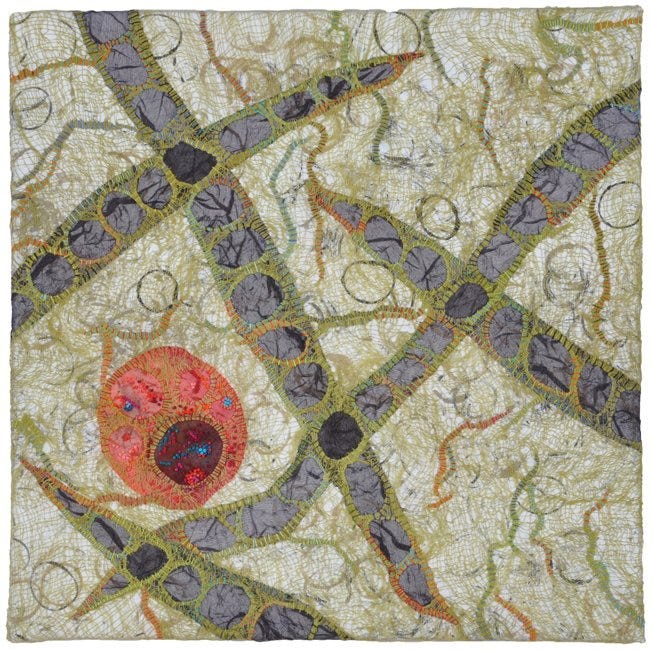
Sometimes I think I’ll never be a mother, but I forget I’m already a mother, probably even a grandma. When I was 18, I worked at a fish and game in Alaska. Old Greg and Young Greg would stand in the water all day with waders on, grappling up king salmon that would wander into the concrete pathway alongside the hatchery, and I sat in a folding chair and would bend down toward the salmon’s back and pick a scale off of with tweezers and put it on a little card with a grid that held them in place with water-activated adhesive, and then the Gregs would let the fish go. Fish scales grow like tree rings, and you can hot-press the cards (which I did, listening to Portishead) so they make impressions into clear plastic that can be read with a microscope, divulging secrets of the life of the salmon….
Read my progeny.
Heidi Biggs (they/she) is a writer and academic living in Atlanta, GA. They have an interdisciplinary background, holding a B.A. in Literature, MDes in Interaction Design, and PhD in Informatics. They are currently a research scientist at Georgia Institute of Technology exploring intersections of storytelling, theory, design, and technology in relation to climate change. Their writing and research explores queerness, embodiment, land histories, and ecological entanglements and they believe we need new kinds of stories to imagine new worlds.
Susan Circone has lived on both coasts of the U.S. and currently resides in the Portland, OR area. She started quilting in the early 1980s and has been working off and on in fiber ever since. After learning the fundamental skills of quilt construction and how to dye and print her own cloth, she continued her art education at Portland Community College. Susan’s work predominantly uses abstracted microbiological and cell imagery that ties into her background as a research scientist in the geological sciences.
Customs Declaration by Kate Finegan | Artwork by Sarah Grew
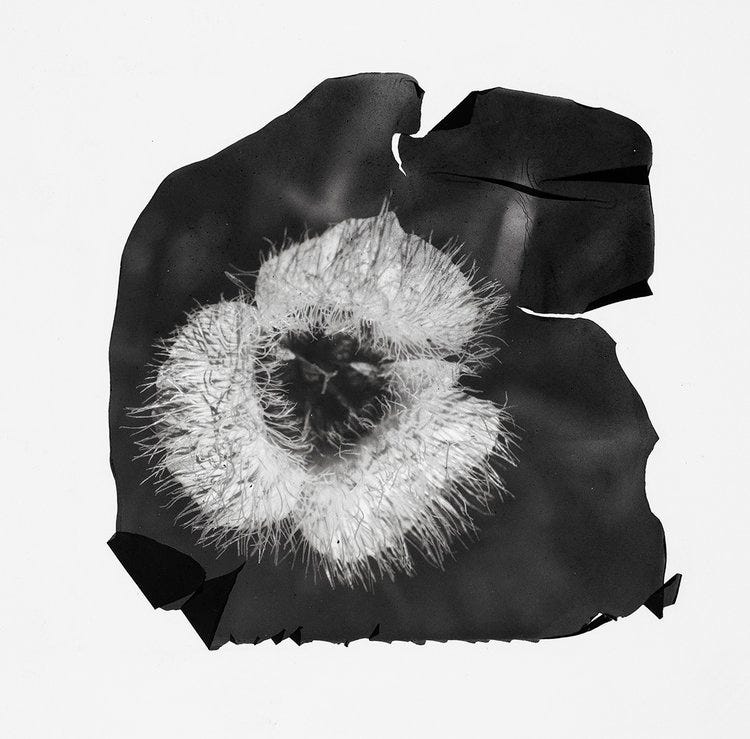
We did not remember ordering rose stud earrings from another country, and when we opened the small envelopes to find hard black seeds of unknown species, we, some of us, forgot. We stuffed them into drawers or tossed them onto basement shelves. Others among us dampened paper towels and set the seeds out on our windowsills to germinate. Some of us planted them straight in the ground but didn’t eat the strange fruit that grew from the mystery seeds. Some of us shouted conspiracy even as the officials told us no, it’s probably just a scam, and several of us unleashed our racism, our xenophobia, at these strange seeds that might feed strange insects that might sting us all to death. We called this war. Some among us received fifty packets, but when we actually counted, it was more than five hundred. A few of us were getting daily shipments marked as jewelry but containing seeds, a synonym for which is germ. One woman received dozens of unwanted shoes marked as returns, but those came from North America, so no one took much notice….
Read Customs Declaration.
Kate Finegan is a writer and editor exploring the interplay between stories and reality. She serves as novel/novella editor for Split/Lip Press, and her work is supported by Canada Council for the Arts, SK Arts, and Access Copyright Foundation. She lives on Treaty Six territory in Edmonton.
Sarah Grew creates art based in painting and photography, that expands into installation and environmental art and contracts into collage and printmaking. Her work includes a range from public art projects to wall based pieces belonging in private collections nationally and internationally. In researching the concepts that enrich her work she has become a beekeeper, studied native plant habitats, and worked as an Artist-in-Residence for a recycling facility in California. Recently, she was an artist in residence on a science research boat studying the effects of climate change on the plankton food web. Previously, Grew was awarded residencies at Sitka Center for Art and Ecology, Playa Artist Residency, the Djerassi Resident Artist Program, Joshua Tree National Park, the Collegeum Phaenomonologicum in Italy, Brush Creek and the Ucross Foundation. She has also received several support fellowships from The Ford Family Foundation. Currently, Grew is working on a several of time-bending projects; paintings that examine modes of expressing time through layering visual art technologies from different periods and concurrently, a photography project using early printing methods to speak to climate change and the fragility of our planet.
summer salt by aureleo sans | Artwork by Linda Sormin
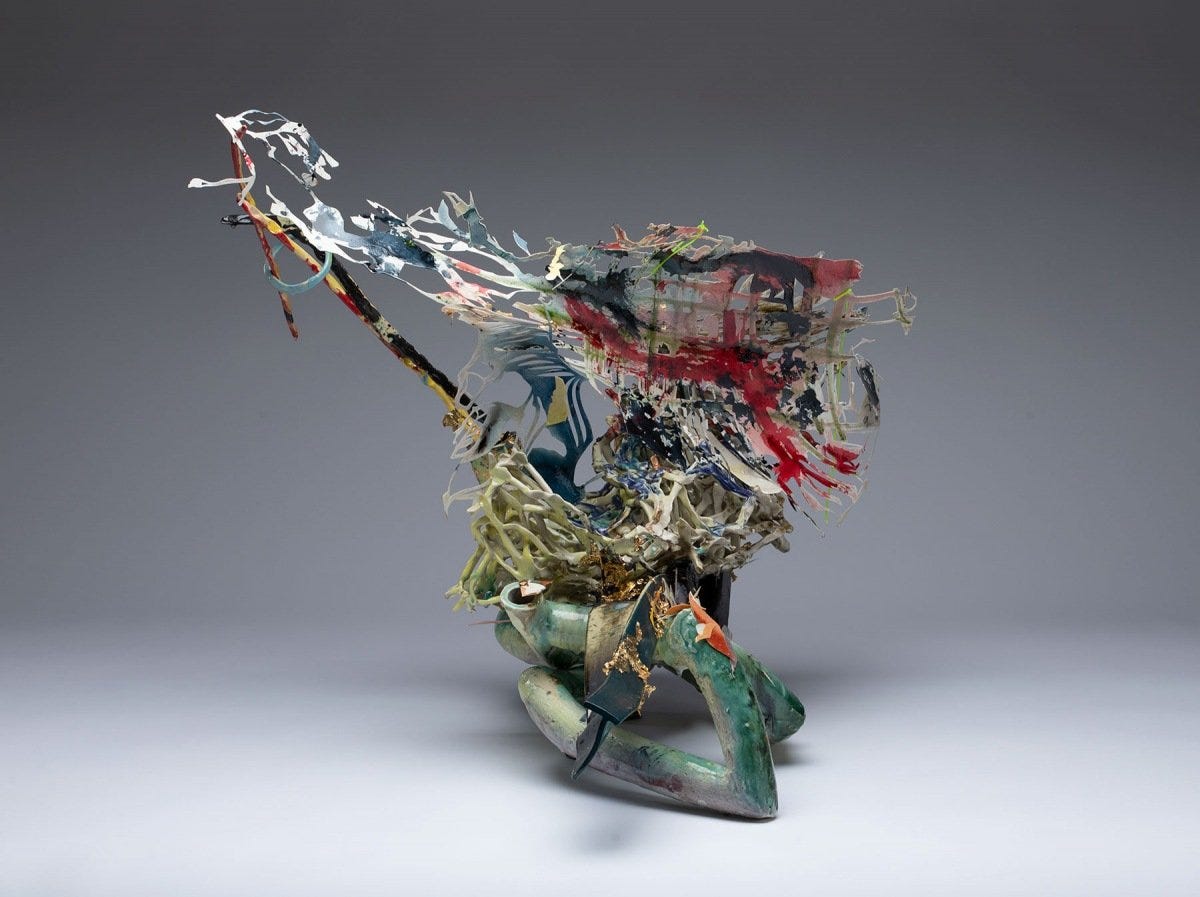
I remember your mop broom eyes, the Fabuluso iguanas, your fingers unseaming, the sad days of salt, the bottles of spic n span. Back then I didn’t know what spic meant. I remember cartons of Fab, the granules of white like cocaine and talc. Then, I existed in the reverb of waves and around the perimeter of the beachside hotel.
Your boss banned me. Customers had complained. I was left outside wanting in. During your Days of Order, I pined for unwashed comfortered beds, episodes of Weird Science. The TV sets at the Emergency Intake Shelter lacked cable. At the homeless school, teachers taught: The things that you can’t afford will define you. Scooping up currency, scooping up chipi chipi shells by the seashore, scooping up all the horizon colors. They always ended in the trash. Glimmer dulls when dry….
Read summer salt.
aureleo sans is a Colombian-American, non-binary, queer, formerly unhoused writer and poet with a disability who resides in San Antonio, Texas. She has been named a Sewanee Writers Conference Scholar, a Tin House Scholar, a Roots Wounds Words Writers Retreat Fellow, a Lambda Literary Fellow, an ASF Workshop Fellow, and a Periplus Fellow. Her work has appeared in Shenandoah, Electric Literature, Passages North, the 2023 Best Micro Fiction Anthology, and elsewhere.
Linda Sormin explores fragility, upheaval, migration, survival, and change through sculpture and site-responsive installations. She was a 2021 and 2023 participant at European Ceramic Workcentre in the Netherlands, creating new work for three exhibitions: Ceramics in the Expanded Field: Sculpture, Performance and the Possibilities of Clay at MASS MoCA, North Adams, MA, USA (October 16, 2021 - April 2, 2023), No Boundaries at Messums, London, UK, a solo exhibition at Messums, Wiltshire (March 5 – May 1, 2022), and a two-person exhibition at Peach Corner Gallery in Copenhagen, Denmark (September 29 – November 5, 2022). Sormin lives and works in New York City, and is an Associate Professor of Studio Art at New York University.
Stingers & Summits by Leila C. Nadir | Artwork by Cary Adams
I was pretty sure I had a handle on what was happening in the world, but around 1987 or 1988, when I was twelve years old, the story switched up on me. For as long as I could remember, the US was good. Afghans were good. Ronald Reagan was great. And the Soviet Union was pure evil. No, wait—back to Reagan. Reagan was off-the-charts excellent. He’d cowboy-punch communism right in the face if that’s what it took to save the world from nuclear disaster. And Afghan Freedom Fighters, on the front lines battling the Soviet Empire, they were most glorious. Reagan loved them so much that he invited them to sit with him on the White House’s white couches while photographers took loads of photos.
Read Stingers & Summits.
Leila C. Nadir is an Afghan-American writer and artist working on a memoir that examines the global geopolitics that invade our living rooms and the intimate violences that reverberate across the planet. She has received awards and fellowships from MacDowell, Hedgebrook, Bread Loaf, de Groot Foundation, Tin House, Aspen Summer Words, and Maine Arts Commission. Her writing has appeared (or will soon) in Michigan Quarterly Review, Black Warrior Review, Khôra, Shenandoah, North American Review, Asian American Literary Review, Aster(ix), and ASAP/J.
Cary Adams is an interspecies kin-maker, folk-punk musician, environmental artist, and creative-critical researcher investigating a modern memory disorder that he and his collaborator Leila Nadir call “industrial amnesia.” His work is in the collections of the Whitney Museum of American Art and the New Museum and has been supported by awards, fellowships, and residencies from the National Endowment for the Arts, New York Foundation for the Arts, New York State Council on the Arts, Franklin Furnace Fund, and the Maine Arts Commission.
Swim around in KHÔRA.
Artists and Writers
We’re looking for features and our future teams! To enter KHÔRA’s collaborative waters:
Writers, read about KHÔRA’s 500 Words here.
Artists, send your artwork to KHÔRA's Images here.
Team-based, collaborative, and curated, KHÔRA is a form that is continually opening. We invite you to join us in sustaining it together. We don't believe in rejections. KHÔRA’s 500 Words is about considering how multiple voices can be heard; how frameworks, traditions, and projects can inform each other; and how new perspectives emerge from collaboration and openness. If you are a visual artist or interested in sharing your artwork or images, ready about KHÔRA’s Images here.
Your words/images will always remain active in KHÔRA’s ocean, and you won’t ever receive a notice of rejection from us. We know this process is not perfect; we wish to stay open to the possibility that at any point, your work will be a fit for a curated issue or team collaboration. This doesn’t need to be a completed piece—think of it like a sample of your work at any length up to 500 words.
Once you send 500 Words, your work will remain in our inclusive and expansive space. You can send 500 Words more than once—there’s no limit to how many times you can send us new work; just no repeats, please. KHÔRA doesn’t publish previously published work, but feel free to share any 500 words you want as a sample (published or unpublished).
If you love what you’re seeing, please subscribe, share, tweet, retweet, and post, and KHÔRA will be back soon.
With galactic gratitude,
Leigh Hopkins
and the Corporeal/KHÔRA squad





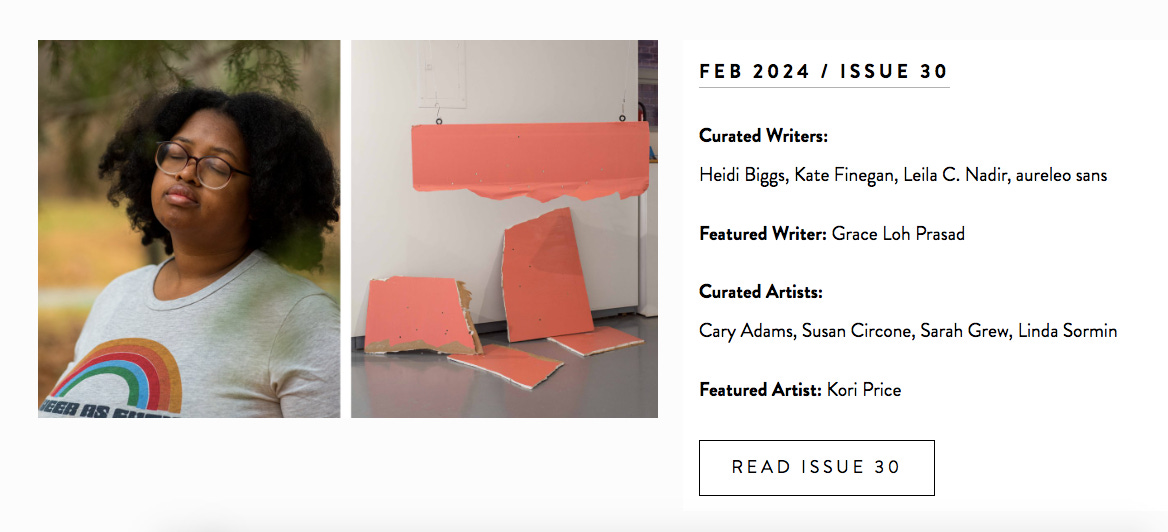
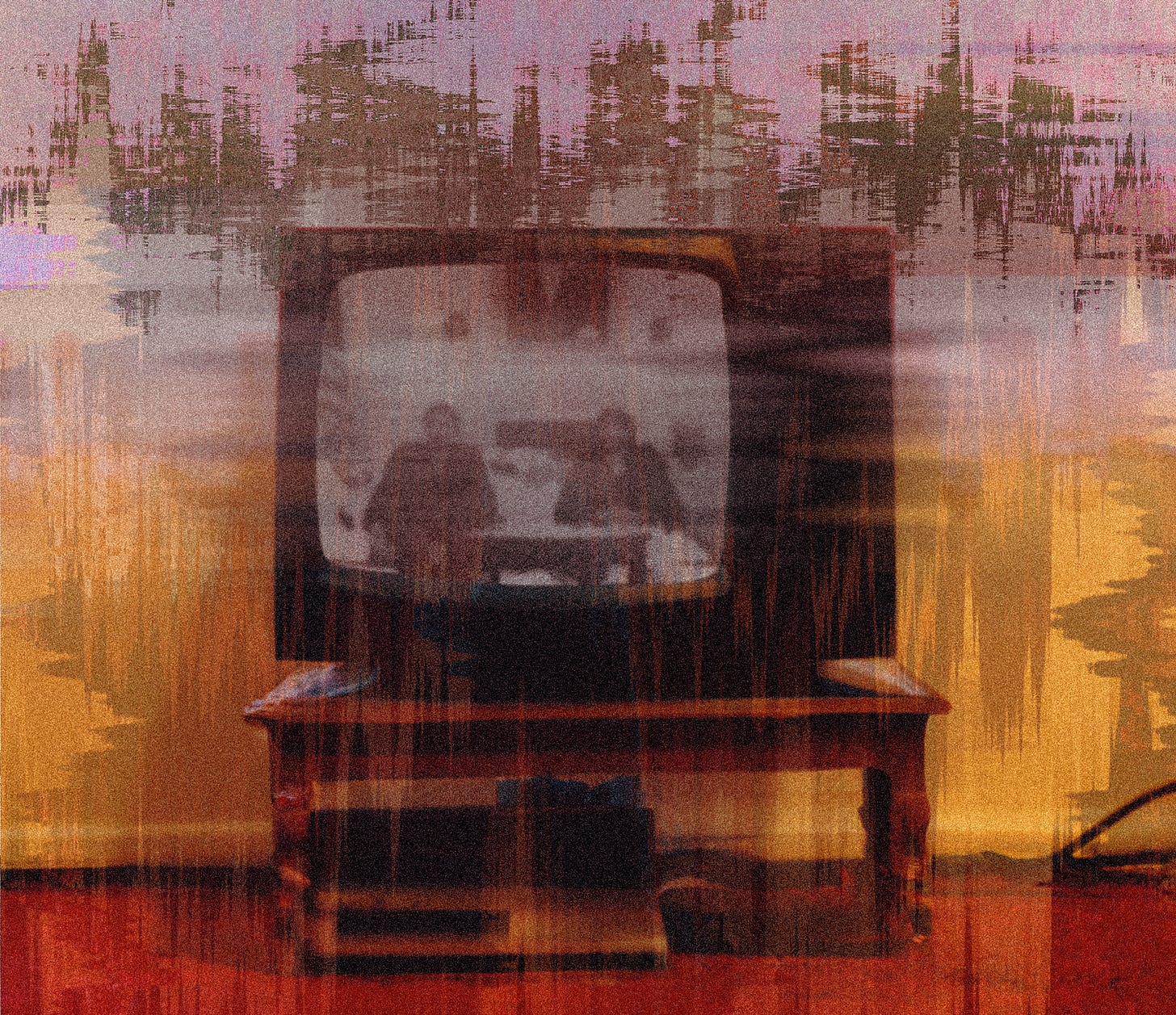
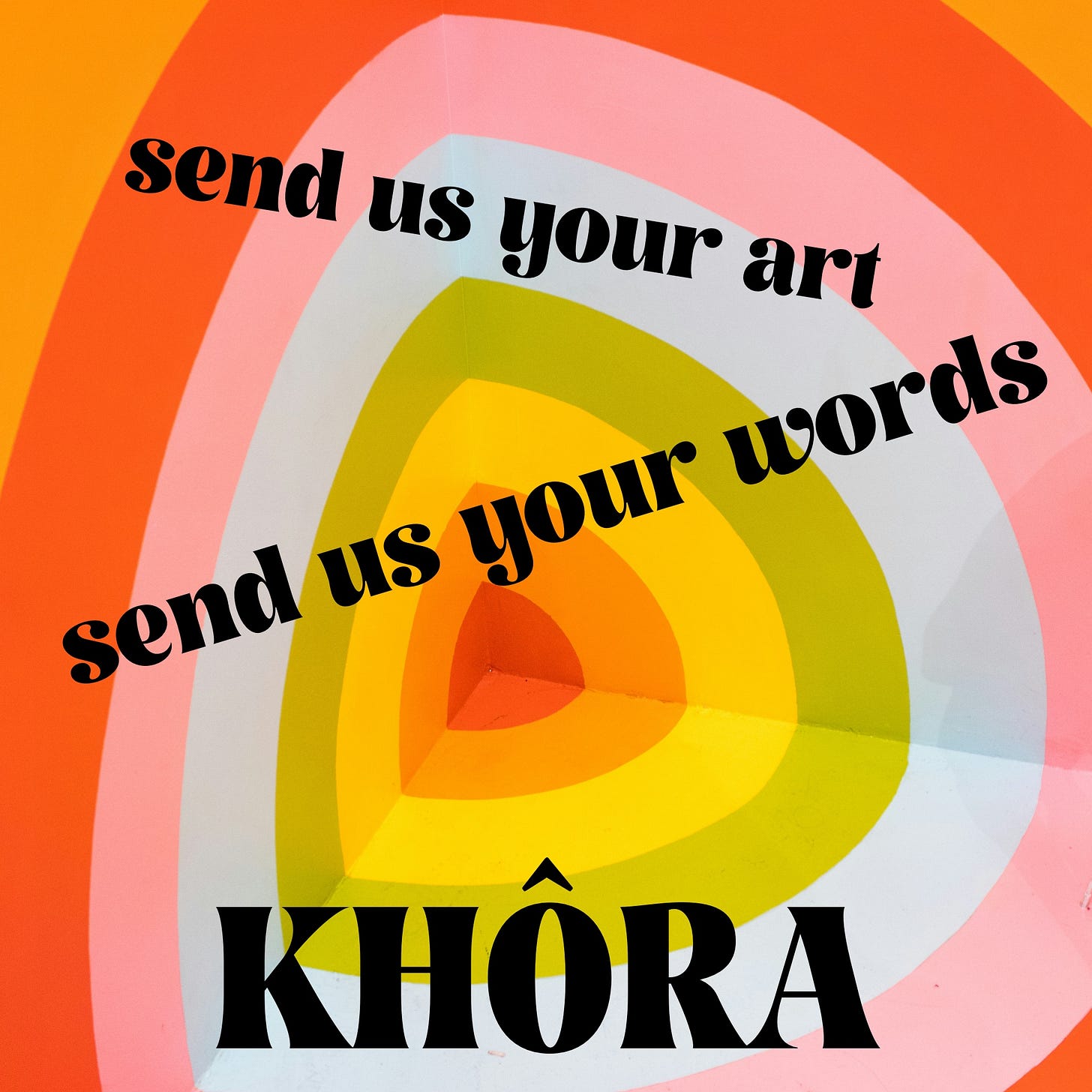
Love to see Khora on Substack! <3